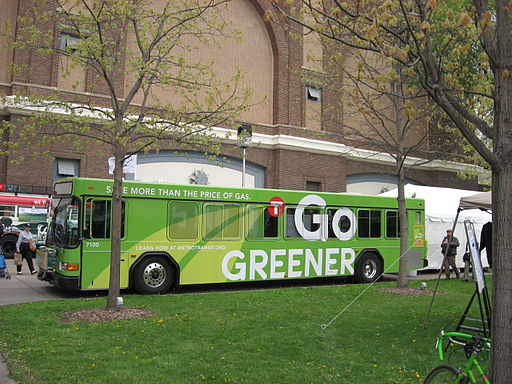by Krista Sanow
 |
| By Jü, via Wikimedia Commons |
If I’m being completely honest, making environmentally conscious decisions wasn’t something I often did until I started working at the Center for Global Environmental Education (CGEE) this past January. Sure, I tried to recycle when I could, and I shut the lights off when I left the room, but my efforts to protect the planet never stretched much farther than that. Working at CGEE is now a weekly reminder that the way we all live now is unsustainable, and that I can change some of the things in my life to keep our big, beautiful planet big and beautiful.
After that initial epiphany, however, the question remained -- how can I, a college student living on campus with a sparse budget, make a positive difference to the natural world around
me?
I found some simple ways to “go green” without spending too much effort or the pennies remaining in my ever-dwindling bank account:
 |
| By Everaldo Coelho, via Wikimedia Commons |
First, there’s the simple yet exceedingly important act of turning off lights and unplugging appliances when not in use. Both are such easy tasks, yet they are often over-looked. Energy.gov says that a simple rule to live by is to turn off the lights if you’re leaving the room for longer than 15 minutes. Sure, it seems easy enough, but sometimes shutting off the lights slips the mind, especially if you have a heap of assignments to work through. The same goes for unplugging appliances. Using a surge protector power strip makes it exceptionally easy to keep “phantom energy” (energy sucked up by appliances that are plugged in but aren’t turned on) from being used. With the surge protector, all it takes to be more “green” is the flip of a switch!
How about being green while staying up all night cramming for that midterm? Well, if you plan on relying on coffee to keep you going, why not drink it in a reusable cup? Even though they’ll cost a little more up front, buying and reusing a cup from your favorite coffee store could save you money in the long run, because a good majority of coffee stores now give a discount to those who use those reusable mugs. So, it’s a win-win for everyone!
 |
| By Paul Robinson, via Wikimedia Commons |
On the topic of reusable items, cloth totes are always a good purchase; some places sell them for 50 cents. They’re a ridiculously cheap investment that can have a huge impact on the environment. Plastic bags, when burned, emit toxic gases into the atmosphere. Or, if a bag isn’t burned, it’s likely to end up blowing around on land or causing trouble in waterways. Since they take an obscene amount of time to breakdown, a single plastic bag can end up killing a staggering number of animals. So make the investment, it’s definitely worth it.
Now how do we make every college student’s favorite past time (laundry, obviously) more ecological? Embarrassingly enough, my first time doing my own laundry was during my second week of classes. Luckily there was a chart on the wall that guided me through the confusing time. However, had I known that washing clothes in cold water saves energy and is consequently good for the environment, I would have been pressing “cold” every time! Going one step further, you can save energy by leaving some of your clothes out to dry rather than using a dryer. It really doesn’t take that long for clothes to dry, and buying a cheap drying rack can make it that much easier.
 |
| By Randy Stern from Minneapolis, MN, USA |
Last but not least, transportation. Going to school in a city was a blessing for me, because I wasn’t able to have a car on campus. Not having a car has allowed me to get pretty close and personal with public transportation. At first, taking it was tricky; navigating the bus routes or knowing which stop to get off on the Light Rail seemed impossible. If I can do it, though, anyone can. It’s definitely worth the initial struggle, too. Taking public transit greatly reduces carbon emissions, reduces oil dependency -- which means, if you’re like me, you can spend less money on gas and more on snacks and movie tickets -- and you don’t have to waste time trying to find somewhere to park in the city. Another perk to being in a city is having the opportunity to walk or bike places. Walking or biking are both triple threats. Saving money? Check. Getting exercise? Done. Being environmentally friendly? You bet.
There are so many ways to be good to the environment while in college, but unfortunately, being eco-friendly isn’t always on every student’s mind. Day-to-day, it’s the little things that count. Shopping with a cloth tote, reusing coffee mugs or water bottles, walking places, hanging clothes to dry, and unplugging appliances all add up. One person doing all of these things -- or even some of them -- can have a huge impact on the surrounding world. It’s everyone’s responsibility to keep our planet green and full of life. You can develop environmentally responsible habits at any time, but what better time is there than while in college?

 CGEE Student Voice
CGEE Student Voice
No comments:
Post a Comment